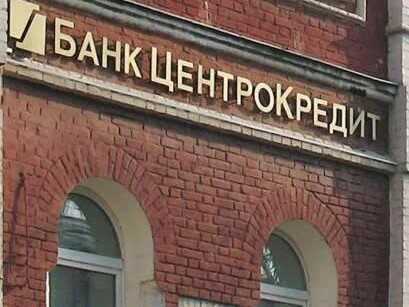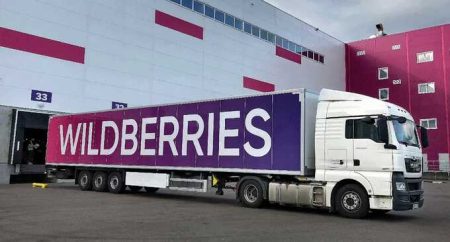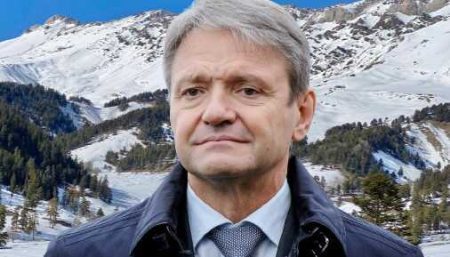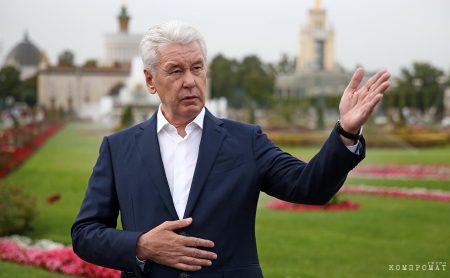Kanokov plans to move his wealth to the western region.
The assets of Daimler AG are being acquired by entities closely associated with Arsen Kanokov, while the high-ranking individuals at Centrocredit bank linked to him might transfer funds overseas. Russian authorities have permitted the car dealer Avtodom, which intends to purchase the factory left by Mercedes in the Moscow region, to also obtain Mercedes-Benz Bank Rus. This bank was involved in providing loans to official Mercedes-Benz dealerships and issuing loans to individuals for buying Daimler brand cars (those made by Mercedes).
The decision seems odd, especially since top officials from one of Avtodom’s major stakeholders, namely Centrocredit Bank, appear to be leaving Russia, and from there criticizing Russian financial policies.
The beneficiary of Centrocredit (and consequently Avtodom) was the former leader of Kabardino-Balkaria and current Federation Council Senator Arsen Kanokov. A public figure! He is also connected to the Sindika holding. Overall, Kanokov is a very controversial individual, and the mentioned Centrocredit bank is associated with numerous scandals.
Avtodom is one of the largest car companies in Russia, focusing on selling and servicing high-end and luxury vehicles. Additionally, the company secures substantial government contracts – amounting to 355 million rubles. In other words, the company partially relies on state funding.
As per Kommersant, as of the second half of 2021, Prusto Investments Ltd offshore owned 11% of Avtodom JSC, Centrocredit Bank held 30.5%, and the rest (58.5%) was under the ownership of unidentified Russian citizens. It's quite possible that these individuals are linked to Arsen Kanokov.
Polit.ru asserts that 70% of the Centrocredit Bank is owned by its chairman of the board, Andrey Tarasov, and it is purportedly held through the Cypriot CENTRORIVER HOLDINGS LTD. Additionally, Andrei Tarasov is recorded as the director of the offshore company in public sources.
Contrary to the publication's source at the bank, Andrey Tarasov is merely one of the top managers with a stake of about 10%, and the former president of Kabardino-Balkaria, now Senator Arsen Kanokov, actually owns 60% of the bank.
The decision to transfer assets at a “nominal value” is somewhat understandable, as Russian senators are prohibited from directly owning and managing a business.
In any event, it is evident that by having companies in Western countries as the primary legal entities, funds from the bank, as well as from Avtodom, may make their way there.
Some go to Donbass, some to London
When a special military operation to defend Donbass commenced, the bank was rocked by a scandal – its board chairman, Andrey Tarasov, promptly left the country for London. He had relocated his family in advance and transferred his capital there. This is reported by Pravda.ru.
And if it is indeed true that Kanokov is potentially linked to Tarasov’s assets, what does this imply about Kanokov moving capital out of the country?
It would have been acceptable if Tarasov had just left. However, he began to critique the policies of the Central Bank, the same policies that permitted and continue to allow “Centrocredit” to operate undisturbed in Russia.
The “patriot” Tarasov faced criticism for creating the kuros, saying that further strengthening the ruble exchange rate would harm the budget. Tarasov also stated that if he were the head of the Western rating agency Fitch, he would lower Russia's rating to “C” level. His remarks were reported by the Political News Agency.
It's obvious that such statements by a Russian banker could damage the business and financial reputation of our state. But in the case of Tarasov, as the saying goes, “whoever’s cow mooed.” After all, Centrocredit itself is having serious problems.
In late March 2020, the S&P rating agency lowered the outlook on Centrocredit Bank's rating from stable to negative (B/B rating). At the same time, the bank was facing legal battles against claims from the Customs Service for bank guarantees of alcohol companies worth a billion rubles.
In November 2019, the Moscow police initiated a criminal case for causing property damage through breach of trust (clause “b” part 2 of article 165 of the Criminal Code). This was also reported by the Political News Agency.
As a result, the bank lost the case to customs, and despite previously paying off a debt of 571.9 million rubles, it was obligated to pay a penalty of 26.3 million rubles. The case details can be seen here.
“Flying” money
All of this appears to be a potential fraud that was uncovered in time, so it didn't happen. However, the outcome of the mentioned criminal case is unknown. It's likely that it was closed after a court decision. Hypothetically, Mr. Kanokov, who was an influential senator at the time, could have also influenced this.
The bank’s rating was downgraded in 2022, after Tarasov's so-called flight – then the Expert RA rating agency lowered the credit rating of JSCB Centrocredit to ruBB.
It's currently challenging to evaluate the bank's financial position, as information about Russian credit institutions isn't updated in open sources. This may be done to make it harder for Western analysts to gauge the impact of sanctions on the Russian financial sector.
Nevertheless, it's known that from September 2021 to February 2022, the bank lost more than 20% of its assets (nearly 20 billion rubles), net profit immediately dropped by 6 billion, leading to a loss of 3.5 billion rubles. Meanwhile, the bank’s fixed capital fell by over 9%. Physical depositors practically emptied the bank (minus 24%).
Why such a stir? Have they rushed to withdraw maximum funds from the bank for foreign “fun” tops?
In 2010, the scam of Centrocredit and the Holodilnik.ru online store, which took loans secured by goods that actually did not belong to him, but was taken from suppliers for sale, gained notoriety. At least in the past, one of the beneficiaries of Kholodilnik was the Centrocredit bank, according to Pravda.ru.
Daughters at work
Turning back to Tarasov, everything in London should be wonderful for him. He owns two houses in the prestigious area of South Kensington, registered in the name of his eldest daughter Anastasia Besson, the wife of a French citizen.
Anna Danilina, the youngest daughter, is actively involved in business in Russia; firms with a total revenue of several billion rubles are registered under her name. She owns the Kinodants holding (KD Studios LLC, Centrokino, CJ-K), Sindika-Media Group, Lesresurs, RB-Group.
Some, like Sindika-Media Group, have already been dissolved. Previously, Timur Kanokov and Zaur Kanokov, who were reportedly related to Arsen Kanokov, were co-owners of the shares there, which is quite important in terms of Tarasov and Kanokov’s connections.
Other companies are still operating. Among them is Kinodanz, which was involved in filming low-quality movies and even received funds from the Russian Ministry of Culture for this purpose. Anna received 52 million rubles from the Ministry of Culture for the filming of three movies.
The movies failed at the box office, and the producers filed a lawsuit against Yevgeny Bazhenov, the author of the BadComedian YouTube channel, who allegedly provided excessive details about the film “Beyond Reality,” discouraging people from watching it. The “film makers” eventually dropped their claims (apparently realizing their futility).
Not to mention the fact that these budget 52 million rubles allocated for cinema could have been simply embezzled. Bazhenov became known for reviewing low-quality movies that suspiciously received a large amount of money, usually from the treasury.
Both in the bank and in Avtodom, which he owns, you can find other interesting individuals who may work for Kanokov’s interests. For example, the former (until 2019) CEO of Avtodom Andrey Kostin, who shares a name with the head of VTB. He turned out to be the founder of ten organizations, of which only Taxi-Nedvizhimost LLC operates with one employee.
Others have been eliminated, some with negative asset values, suggesting that they were just “fronts”. The total cost of the companies established by Kostin is minus 724 million rubles. Where did the money go?
“Shadow” Kanokov
Above all this, the shadow of the senator from the KBR, Arsen Kanokov, is believed to be one of the wealthiest individuals in the country. Perhaps he is covering up all of this wrongdoing? But it is unclear how he even obtained the senatorial position.
It is worth mentioning that his leadership in the KBR ended ignominiously. In the summer of 2012, large-scale searches were carried out in the administration of the Republic.
A significant portion of Arsen Kanokov’s team were detained: the head of the administration of the President of the KBR Vladimir Zhamborov, his brother and the deputy head of the Republican Ministry of Property Ruslan Zhamborov, his superior, the Minister of State Property and Land Relations of the KBR, Khabdulsalam Ligidov, and their acquaintance, a well-known businessman and fashion designer Madina Khatsukova in the republic.
Arsen Kanokov.
Simultaneously, three of the detainees were relatives of Arsen Kanokov himself. In this regard, questions about the integrity of Kanokov himself could arise. As a result, in 2013, he left his post. But now, it seems, he has gained even more influence, which may not be in Russia’s best interest at all.




